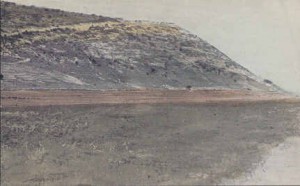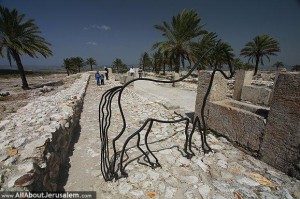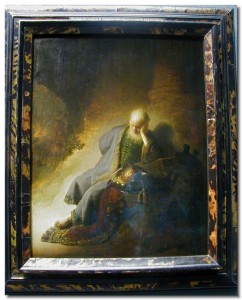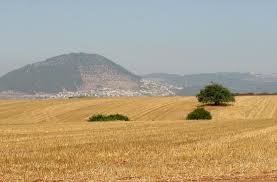Parshat Yitro describes Ma’amad Har Sinai, the prophetic experience shared by the entire Jewish People at Mount Sinai. It was a pivotal point in our history, marking our entry into the covenant with G-d and our commitment to accepting His Torah. The experience itself was awe-inspiring, even frightening. As the Torah describes:
וְכָל הָעָם רֹאִים אֶת הַקּוֹלֹת וְאֶת הַלַּפִּידִם וְאֵת קוֹל הַשֹּׁפָר וְאֶת הָהָר עָשֵׁן וַיַּרְא הָעָם וַיָּנֻעוּ וַיַּעַמְדוּ מֵרָחֹק
And the whole nation saw the sounds and the lights and the sound of the Shofar, and the mountain was smoking; the nation saw, and shook, and stood far away. (Exodus 20:14)
The Haftarah of Yitro also describes an awe-inspiring prophetic experience. Yeshayahu is shown G-d’s Throne, as it were, surrounded by angels. This vision also becomes frightening, in similar ways:
וַיָּנֻעוּ אַמּוֹת הַסִּפִּים מִקּוֹל הַקּוֹרֵא וְהַבַּיִת יִמָּלֵא עָשָׁן
The pillars shook from the sound of the call, and the house was filled with smoke. (Yeshayahu 6:4)
But unlike Har Sinai, where the overwhelming experience was a prelude for receiving G-d’s Torah and becoming His nation, Yeshayahu’s vision is followed by a message of destruction of the cities of Yehudah.
Why is this prophecy of punishment and destruction introduced by a such a lofty vision, practically a reenactment of the experience of Har Sinai? What does Har Sinai have to do with the failings of Yeshayahu’s generation?
In Yeshayahu’s vision of the Heavenly Court, we read the famous prayer of the angels:
וְקָרָא זֶה אֶל זֶה וְאָמַר קָדוֹשׁ קָדוֹשׁ קָדוֹשׁ ה’ צְבָא-וֹת מְלֹא כָל הָאָרֶץ כְּבוֹדוֹ:
Each [angel] called out to the other and said, “Holy, holy, holy, is Hashem Tzva-ot! The whole world is filled with His Glory!” (Yeshayahu 6:3)
The Name that the angels use to address G-d, “Hashem Tzva-ot,” is the key to understanding how the vision ties to Sinai, and to the message of destruction.
“Hashem Tzva-ot”, one of the Names of G-d, is usually translated as “Lord of Hosts,” which literally means “commander of armies.” The word “army” is plural, because G-d has two armies: an Army of the Heavens and an Army on Earth. The Army of the Heavens consists of the various angelic beings described in prophetic visions in the Tanach, including that of the Haftarah of Yitro. G-d’s Army on Earth is the Jewish People. We know this to be the case because it says so explicitly in the Torah. When the Jewish People leave Egypt as a newly formed nation, the Torah uses the following phrase to describe them:
וַיְהִי בְּעֶצֶם הַיּוֹם הַזֶּה יָצְאוּ כָּל צִבְאוֹת ה’ מֵאֶרֶץ מִצְרָיִם:
…on that very day, the armies of Hashem left the land of Egypt (Shemot 12:41)
The purpose of an army is to execute the will of their commander. The angels do this as a matter of course; our tradition tells us that they have no freedom of choice, and no independent thought. Their entire being is dedicated to doing G-d’s will.
The Army on Earth is made up of human beings, the Jewish People. Unlike the angels, we do have freedom of choice. When the Jewish People accepted the Torah, we made a conscious decision to put G-d’s will above our own, and His wisdom above our understanding. That is what it meant when we said, “We will do, and we will hear” (“Na’aseh Ve’nishma”) at Sinai: whatever G-d says, that is what we will do. He is now our commander, and we subordinate our freedom of choice to His Torah.
The Midrash links this decision to accept the Torah to the Haftarah of Yitro:
אמר רבי הונא בשם רבי חייא אלו ישראל שהקדימו עשיה לשמיעה ואמרו כל אשר דבר ה’ נעשה ונשמע (שמות כ”ד) בא ללמדך שגדולים הצדיקים יותר ממלאכי השרת תדע לך שבשעה שאמר ישעיה כי איש טמא שפתים אנכי ובתוך עם טמא שפתים אנכי יושב (ישעיה ו) א”ל הקב”ה ישעיה בעצמך אתה רשאי לומר איש טמא שפתים אבל לישראל אתה אומר בתוך עם טמא שפתים שהם הקדימו עשיה לשמיעה ומיחדין את שמי פעמים בכל יום ואת קורא אותן עם טמא שפתים
R’ Huna said in the name of R’ Hiya: Israel put doing before hearing, and said “Everything that Hashem says, we will do and we will hear” (Shemot 24). This teaches us that the righteous are greater than the angels.
Know, that when Yeshayahu said, “I am a man of impure lips and I live among a nation of impure lips”, Hashem said to him, “Yeshayahu! About yourself you can say “impure lips”, but about Israel you’re saying, “a nation of impure lips”?! They put doing before saying, and unite My name twice a day [by saying Shema], and you’re calling them a nation of impure lips?!” (Midrash Tanhuma Vayishlach 2)
According to this Midrash, the choice of the Jewish People to accept G-d as their Commander makes us greater than the angels themselves. They do not have a will of their own to subordinate to His, and we do.
Moreover, the Midrash points out, this choice was not a one-time occurrence; we accept our commitment to G-d’s sovereignty every single day when we say Shema. When we say, “Hashem Elokeinu Hashem Echad,” what we mean is that He, and Only He, runs the world. He, and only He, gives commands to all Creation, and only those commands are to be followed; it is only within His framework that we must exercise our free will. Shema is the mission statement of the Army of G-d.
When Yeshayahu received his prophecy, the Jewish People had been derelict in fulfilling their mission. Before being sent to tell them to shape up, Yeshayahu was shown a vision of angels, G-d’s Army of the Heavens, as they chant their motto, “Kadosh, Kadosh, Kadosh, Hashem Tzva-ot.” This vision was meant as a reminder of the dedication expected of the Army of G-d on Earth. Yeshayahu was sent to tell them that they need to do better; they need to hear what G-d has to say and act on it, as they had committed to do at Sinai by saying “Na’aseh ve’Nishma.”
However, when Yeshayahu himself starts criticizing the Jewish People, and says “I live among a nation of impure lips”, G-d gets upset with him. Saying that the Jewish People are “people of impure lips” suggests that our commitment to the Torah was mere lip-service. This is not the case. As the twice-daily Shema demonstrates, our commitment is both real and lasting.
Unfortunately, being that we are not actually angels, and we do have free will and make our own decisions, we occasionally fail to live up to the expectations of Hashem Tzva-ot. We occasionally need to be reminded of our mission, of what is expected of us. That is the purpose of the Haftarah in showing Yeshayahu a vision that was an awe-inspiring re-enactment of Har Sinai, before sending him to remind the Jewish People to execute the Will of our Commander.
That is also the reason that the Siddur has us repeat and recreate this vision of angels chanting “Kadosh, Kadosh, Kadosh”, right before we reaffirm our commitment to the commandments by saying Shema, and again, as we stand, angel-like, at the Amidah of Shemoneh Esrei.
The Army of the Heavens reminds the Army on Earth to do the will of our mutual Commander, Hashem Tzva-ot.
Copyright © Kira Sirote
In memory of my father, Peter Rozenberg, z”l
לעילוי נשמת אבי מורי פנחס בן נתן נטע ז”ל
Haftarot Unrolled http://www.torahforum.org/haftara
Like this:
Like Loading...




